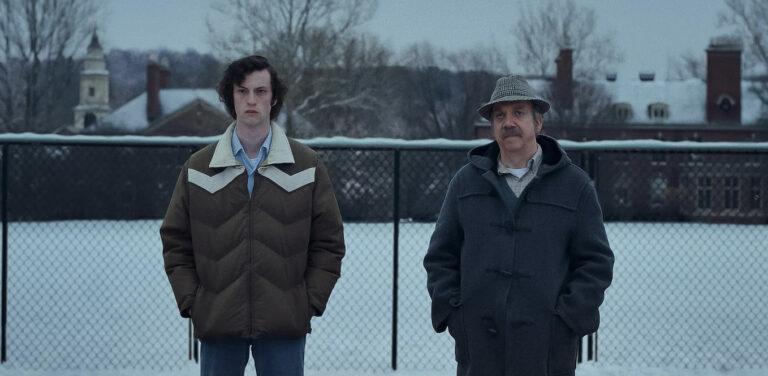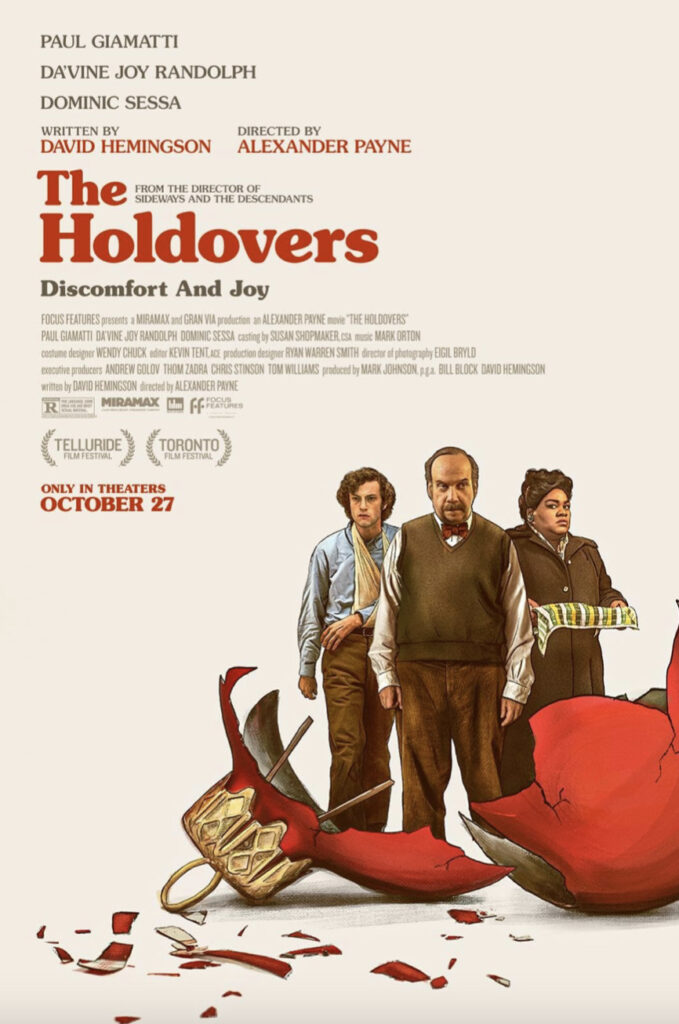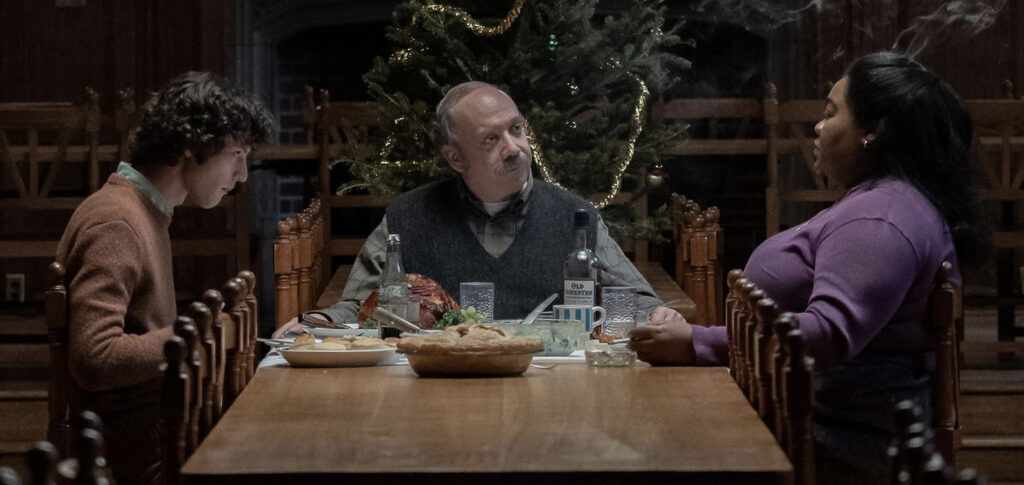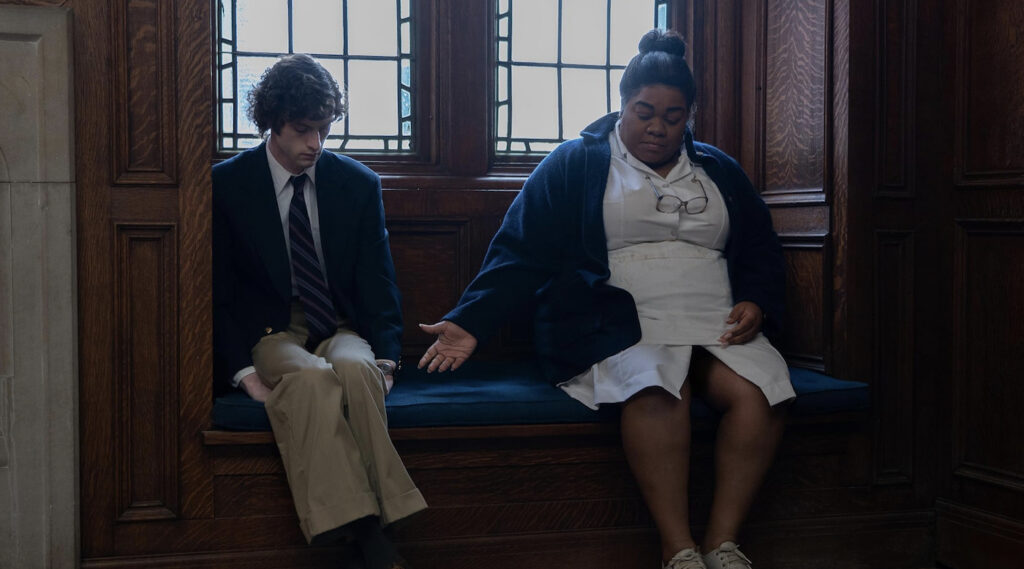
Photo by Courtesy of FOCUS FEATURES – © 2023 FOCUS FEATURES LLC. ALL RIGHTS RESERVED.
Synopsis : From acclaimed director Alexander Payne, THE HOLDOVERS follows a curmudgeonly instructor (Paul Giamatti) at a New England prep school who is forced to remain on campus during Christmas break to babysit the handful of students with nowhere to go. Eventually he forms an unlikely bond with one of them — a damaged, brainy troublemaker (newcomer Dominic Sessa) — and with the school’s head cook, who has just lost a son in Vietnam (Da’Vine Joy Randolph).
Rating: R (Some Drug Use|Language|Brief Sexual Material)
Genre: Holiday, Comedy, Drama
Original Language: English
Director: Alexander Payne
Producer: Mark Johnson, Bill Block, David Heminson
Writer: David Hemingson
Release Date (Theaters): Wide
Box Office (Gross USA): $846.2K
Runtime:
Distributor: Focus Features
Production Co: Miramax, Gran Via

Exclusive Interview with Writer David Hemingson
Q: Director Alexander Payne is known for not just a great director, but also a great writer as well. But you also have a great track record of TV series as a writer, You wrote this as a TV pilot about the boarding school initially. How did you end up collaborating with Alexander Payne on this one?
David Hemingson: I wrote this pilot six years ago. It was a deeply personal pilot about my own experience called “Stonehaven.” My agent read it and really liked it. He was like, “I love this. It’s set in the ‘80s and is so specific to this whole prep school world. I’m not sure what we do with it because it’s like nothing else out there.” I’m like, “I wrote it because I had to write it.
I needed to make this sort of statement. I really wanted to commemorate my experiences.” As it turned out, one of the reasons I’m still with my agent is because he found a way to get it to Nils Mueller, a friend of Alexander’s — who gave it to Alexander. He read it and called me up out of the blue. When I first got the phone call, I thought it was a friend messing with me. When he called, I was coming back from the airport.
I had flown back from Europe, where I was shooting a TV show. I was exhausted, dog-tired to the point of delirium and the phone rang. I didn’t even look at who it was. I said, “Hello, is this my car? Hello, David here.” “Hi, this is Alexander.” I saw the Omaha area code and went, “Oh my God, could this actually be him?” He said he read the pilot and loved it. He didn’t want to make it, but he wanted to do a film in the same arena and had a log-line, a basic idea that he wanted to do — a premise that he wanted me to run with. That’s how the whole thing started.
Q: This film takes place in the ’70s, but if you focus on the character when watching it, some people might not recognize this as taking place in the ’70s until the character says “Happy New Year.” It’s really amazing. Was that in the script? it’s a very subtle way to notice that it takes place then.
David Hemingson: When Alex first called me, it was a great question. He said, “Would you want to write this film?” I said, “Yes, absolutely.” He said, “OK, quick question —1950 or 1970? I immediately said “1970.” He said, “Why do I want that?” At the time it was 2018 I said “2018 and 1970 have a lot in common.” I would say now 2023 and 1970 have a lot in common [as well]. You’ve got a tremendous degree of income inequality.
You’ve got some very supercharged, racial matters and some really terrible things are occurring around the world with regard to wars. Twas ever thus. So the idea that it was 1970 to me only had to be touched upon. everything that was happening in 1970, all the problems that we had, those points of tension and friction still exist. I was trying to make the movie both timely and set in 1970. but it’s timeless; it spoke to issues of today.
In 1970, all kinds of stealths like in the screenplay, I have like Nixon on the television, helicopters out on the television. In the liquor store, you’ll hear a conversation about the body count in Vietnam. There’s little things in there but we didn’t tend to hold up a sign that said, “1970.” That also goes for the production design as well which is subtly of the period but with details like the clothes or cars; we’re not calling attention to it, we’re just letting it be there.
That gives it a certain timelessness. Though being in 1970, at the same time, when I watch the film “Sideways,” I see there’s something between Alexander Payne and Paul Giamatti that’s really great.
 Photo by Seacia Pavao/Seacia Pavao – © 2023 FOCUS FEATURES LLC. ALL RIGHTS RESERVED.
Photo by Seacia Pavao/Seacia Pavao – © 2023 FOCUS FEATURES LLC. ALL RIGHTS RESERVED.
Q: When I watched this Alexander Payne’s film, “Sideway,” something between Alexander Payne and Paul Giamatti really clicked with each other, so when you brought this script to work with Alexander Payne, did you have Paul Giamatti in your mind as the lead role? Did you exchange the idea through the script?
David Hemingson: I would say by the third conversation, it was going to be Paul Giamatti. It was Alexander who drove it. He said, “Hey, what do you feel about this?” I had a very distinct conception of the character. It was based on the guy who raised me, my uncle. Almost immediately, I said, “How do you get Paul Giamatti for the role?” I just leapt at the possibility.
I’m like, “Are you kidding me? I would love to write this for Paul Giamatti.” Interesting side note, Paul’s father and my father knew each other in college. We found out that they knew each other in college in 1960. I felt this was almost fated, that I should work with Paul Giamatti. Alexander suggested it obviously because of their working relationship with Sideways etc.
I think he’s brilliant, a fantastic actor. the chance to write a screenplay for the two of them to do, drafting off coming off of their original collaboration sideways. How can you pass that up? It was just too great an opportunity. to answer the question, it was always Paul Giamatti.
Q: This film is about a certain solitude that is shared between 3 people. What did you think was the key for these three characters to connect with each other when you write a screenplay for this film?
David Hemingson: The title of the movie is “The Holdovers,” and honestly, sometimes when I’m writing something or even watching the movie after it gets made, I’m like, “Oh, that’s what it’s about. it’s the holdover. they’re all holding over.” They share that they’re all holding over [something] in their own lives, right? Paul is sort of holding over… He’s got a secret that he doesn’t want to emerge; he’s never left his own high school.
Davine, she’s got this tragedy with her son. She’s stuck in a moment that she can’t get out of. Angus has got this terrible secret about his dad and all the weight, guilt, anxiety and fear that lies behind it. Each of them is stuck in a moment in time. The journey of the film is as they get closer, they sort of dislodge each other from those moorings so that they’re able to move on. The theme of the film pretty much is what it means to be stuck and be holding over in your own life. How do we transcend [that] and move on? That’s sort of what the movie is about.
 Photo by Seacia Pavao/Seacia Pavao – © 2023 FOCUS FEATURES LLC. ALL RIGHTS RESERVED.
Photo by Seacia Pavao/Seacia Pavao – © 2023 FOCUS FEATURES LLC. ALL RIGHTS RESERVED.
Q: This film very much puts an eye on Angus’ character, played by Dominic Sessa. His wonderful performances have blown everyone away. He was found in a real school, not just through a regular casting. Talk about his performance and how it resonated with your script.
David Hemingson: It’s funny. I wrote the part, and mind you, certainly, there’s a lot of me in Angus at 16 or 17. We looked all over the world and had something like 800 submissions, around 800 tapes. Alexander and I looked at 70 kids and Dominic was a senior at the school where we were shooting the film. He was a star of the drama department, but he had never acted on film before then, only on plays. In my entire career — I’ve been writing, producing and directing TV for 27 years — I’ve never in my entire life, and I don’t think Alexander has either, encountered an actor who understood film acting more organically.
It was just pure lucky stars that we stumbled upon this kid who’s just remarkable. He reminds me of a collision between Al Pacino and Timothy Chalamet. He’s got a brooding charisma, but also has a beauty to him, like he’s just on top of everything. He’s the sweetest guy, the sweetest and wonderful kid. It was just pure luck that we found him and it was also pure luck that he delivered so consistently at such a high level.
Of course, I’ve got to give credit to Paul Giamatti who worked with him but their connection off camera is mirrored in their performances on camera. I think the intimacy that they developed as friends and as people and that kind of mentor/mentee relationship, that teacher/student relationship, existed offscreen and it’s really born out beautifully on screen.
Q: The location of Massachusetts adds some variety to the story line. How did you select the location with boarding schools all over the country? How do it get narrowed down to choosing that location?
David Hemingson: Massachusetts was always in my mind just because I’m from Connecticut. I used to go to a private school in Connecticut, but I used to go up to Massachusetts to run cross country or debate sometimes. I would go to these schools that were really nice. I’d be like, “Wow, I wish I went here because this is really cool.” That’s the first thing now as regards why shoot in Massachusetts? Sure, Delaware has great private schools.
There are two reasons that we wouldn’t go to a place like Delaware. One is that Alexander very much likes the verisimilitude. He likes the reality of a place if it’s going to be the place he wants to shoot in. “The Descendants” was in Hawaii, right? And “Nebraska,” right? He’s a filmmaker who orients himself in a place and invests in that place. He wants the audience to get the reality and truth of it. It was going to be New England initially.
Then he said, “Ok, we’ll look at Connecticut, New Hampshire and, less so, Vermont, but Massachusetts, and Rhode Island…” It is just a film, a film production. The tax breaks in Massachusetts were really good. So, if they’re helping you with the tax breaks, you’re going to shoot there. And it just so happened that it coincided beautifully with the theme and actual location of the script as originally conceived.
Q: I got a feeling that you will get a shot for the Oscar.
David Hemingson: I Pray. I’ll take that energy and hang on to it because I hope so too. I hope everyone affiliated with the film gets the attention. The actors, production designer and, obviously, the director deserves it. They’re brilliant.
Check out more of Nobuhiro’s articles.
Here’s the trailer of the film.

